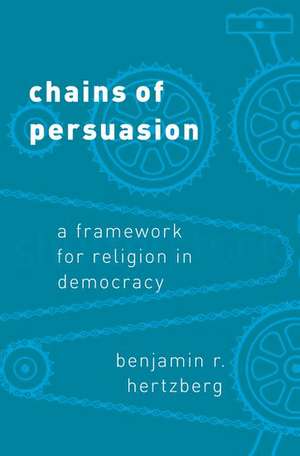Chains of Persuasion: A Framework for Religion in Democracy
Autor Benjamin R. Hertzbergen Limba Engleză Hardback – 9 ian 2019
Preț: 468.48 lei
Preț vechi: 519.68 lei
-10% Nou
Puncte Express: 703
Preț estimativ în valută:
89.65€ • 93.07$ • 74.76£
89.65€ • 93.07$ • 74.76£
Carte disponibilă
Livrare economică 18-24 februarie
Preluare comenzi: 021 569.72.76
Specificații
ISBN-13: 9780190883041
ISBN-10: 0190883049
Pagini: 224
Dimensiuni: 236 x 160 x 23 mm
Greutate: 0.54 kg
Editura: Oxford University Press
Colecția OUP USA
Locul publicării:New York, United States
ISBN-10: 0190883049
Pagini: 224
Dimensiuni: 236 x 160 x 23 mm
Greutate: 0.54 kg
Editura: Oxford University Press
Colecția OUP USA
Locul publicării:New York, United States
Recenzii
Chains of Persuasion is primarily a work of political theory. It should be of interest to serious students of political philosophy and theory.
a thoughtful and very interesting intervention into the discussion of the appropriate relation between religion and liberal democracy. The book is marked by a number of fruitful conceptual innovations and interesting discussion of numerous illustrative examples that serve to flesh out the meaning of the concepts. Perhaps most importantly, it is marked by an even-handed and even-tempered discussion of religion and politics by an author who is knowledgeable about contemporary political theory, social science, and the practice of religion.
In this ground-breaking book on the vexed topic of politics and religion, Hertzberg ingeniously revitalizes the specifically democratic impulse of liberal politics. He does so by re-describing both democracy and religion as ways of life between which paths of engagement and collective practices of persuasion can be built. An important book for our troubled, excessively polarized times.
As the world grows ever more tightly connected, religious difference seems not to be going away; what should we do about that? Increasingly one hears suspicions regarding whether broadly liberal democratic regimes can successfully manage such difference. Hertzberg's work substantially helps us see why liberal democratic regimes may have more promise than the critics suspect. This book is a landmark in what we can now begin to call, using Hertzberg's terms, 'post-secular liberal political theory.'
Avoiding public discussion of politics and religion might make for good etiquette, but Hertzberg shows why it makes for bad citizenship. Democratic life requires more than relegating religion to the purely private. Chains of Persuasion provides a blueprint for (and an example of) how we can do better: a fresh, sophisticated, and wise contribution to democratic theory and public discourse itself.
a thoughtful and very interesting intervention into the discussion of the appropriate relation between religion and liberal democracy. The book is marked by a number of fruitful conceptual innovations and interesting discussion of numerous illustrative examples that serve to flesh out the meaning of the concepts. Perhaps most importantly, it is marked by an even-handed and even-tempered discussion of religion and politics by an author who is knowledgeable about contemporary political theory, social science, and the practice of religion.
In this ground-breaking book on the vexed topic of politics and religion, Hertzberg ingeniously revitalizes the specifically democratic impulse of liberal politics. He does so by re-describing both democracy and religion as ways of life between which paths of engagement and collective practices of persuasion can be built. An important book for our troubled, excessively polarized times.
As the world grows ever more tightly connected, religious difference seems not to be going away; what should we do about that? Increasingly one hears suspicions regarding whether broadly liberal democratic regimes can successfully manage such difference. Hertzberg's work substantially helps us see why liberal democratic regimes may have more promise than the critics suspect. This book is a landmark in what we can now begin to call, using Hertzberg's terms, 'post-secular liberal political theory.'
Avoiding public discussion of politics and religion might make for good etiquette, but Hertzberg shows why it makes for bad citizenship. Democratic life requires more than relegating religion to the purely private. Chains of Persuasion provides a blueprint for (and an example of) how we can do better: a fresh, sophisticated, and wise contribution to democratic theory and public discourse itself.
Notă biografică
Benjamin R. Hertzberg researches and teaches in the fields of political theory and philosophy and religion and politics. Previously, Hertzberg was Visiting Assistant Professor of Political Science at Brigham Young University and Robert Wood Johnson Foundation Scholar in Health Policy at Harvard University.
